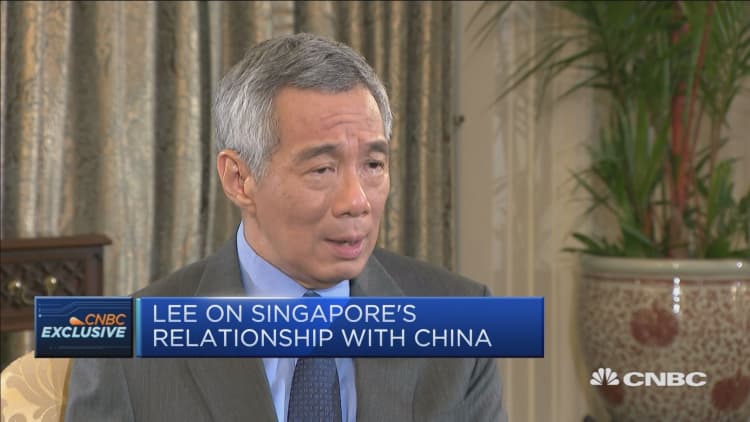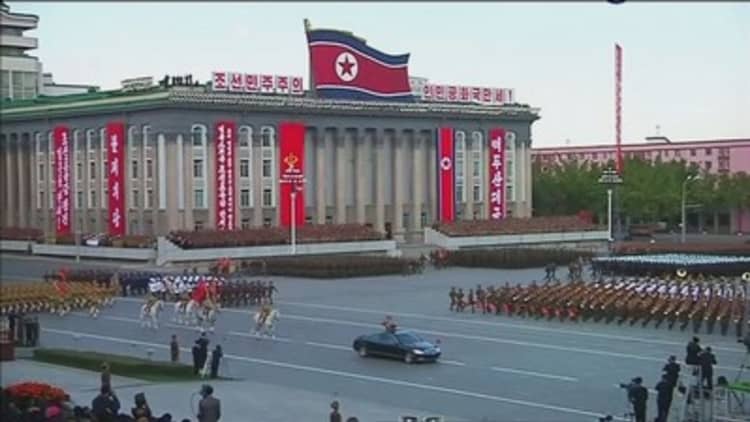
Many nations around the world find themselves in a delicate balancing act between U.S. and Chinese interests, but one island nation perhaps typifies that struggle.
Singapore is a hub for global finance and trade, and so its relationships with the world's two largest economies are vital to its survival. Speaking with CNBC on Thursday, Singaporean Prime Minister Lee Hsien Loong shed light on the balance between the U.S. and China in a changing geopolitical landscape.
"Well, it's never easy to be a small country next to a big neighbor," Lee said.
"If you have one big neighbor only, that's not easy to manage. If you have two big neighbors, well in some ways you have more friends, but in other ways you have to make more difficult choices," Lee added.
Singapore's relationship with the two global giants, he said, also "depends on how the U.S. relationship with China develops," he said.
"If there are tensions between America and China, we will be asked to pick a side. It may not be directly, but you will get the message that: 'We would like you to be with us, and are you with us? If not, does that mean you're against us?' And that's to put it gently," he added.
Singapore however, does not wish to "pick sides," he said.
Lee spoke with CNBC ahead of his visit to the U.S. where he is set to meet President Donald Trump at the White House on Oct. 23.
U.S. and Singapore have had economic, military and diplomatic ties since 1966 — a year after the city-state's independence. Late Singapore Prime Minister Lee Kuan Yew – the current prime minister's father — developed close personal relationships with American politicians including diplomat Henry Kissinger and President Richard Nixon.
Singapore policymakers have also long sought military cooperation with the U.S. because they believed a strong American military presence would add to stability in Asia.
In August last year, President Barack Obama hosted a state dinner for current Prime Minister Lee.
China and Singapore, meanwhile, established official relations in 1990 — although the elder Lee first visited the East Asian giant in 1976 and met every Chinese Communist Party leader from Mao Zedong to current President Xi Jinping.
For decades, the elder Lee advised Western leaders on China and at the same time shaped Singapore's policy on balancing the two major countries.
The warm ties between Beijing and Singapore — which has a large ethnically Chinese citizenry — however, have been strained recently as China becomes increasingly assertive.
The issue that reportedly irked Beijing involved the 2016 Hague ruling on the South China Sea, which said China's claims to the disputed waters were counter to international law.
Singapore is not a claimant to any disputed part of the South China Sea, but as a small country it supports a "rules-based international order," Lee said in a 2016 national address.
Late last year, military vehicles belonging to Singapore were impounded in China's Special Administrative Region of Hong Kong en route from Taiwan where they were used in military training. The issue has since been resolved.
The relationship between Beijing and Singapore is now seen to be warming up again after Lee made a trip to the Chinese capital in September this year. During that visit, he met with President Xi and Premier Li Keqiang.
Lee told CNBC on Thursday that the relationship between China and Singapore is now "good" and that the two countries are "forward-looking."
"We are two countries and sovereign countries, so there will always be issues where we don't completely see eye to eye. But fundamentally, there are no basic conflicts in our perspectives. And we both wish to do more together bilaterally, and also in the context of ASEAN," he said, referring to the Association of Southeast Asian Nations.
On China and North Korea
While China has a major role to play in the ongoing North Korea tensions, Lee said Pyongyang may not necessarily comply with Beijing's requests.
The Chinese "are a very big part of North Korea's external trade. And so they have influence over North Korea. But I would not say that the North Koreans will do anything that the Chinese want them to do," said Lee.
Beijing has "complex calculations to balance," he said.
"They are living there with a neighbor. They do not want to destabilize the neighbor at the same time. I think they can't be at all happy with the way things are going with nuclear tests and with missile tests. It must worry them a great deal," Lee said.
Here's the full transcript of Prime Minister Lee Hsien Loong's interview with CNBC.
WATCH: N. Korea threatens unimaginable strike on US



